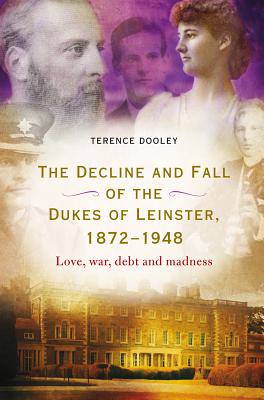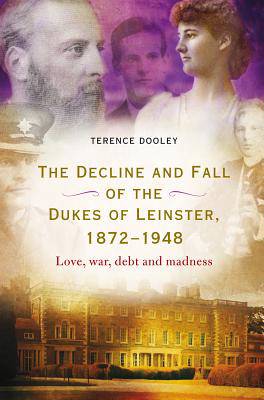
- Afhalen na 1 uur in een winkel met voorraad
- Gratis thuislevering in België vanaf € 30
- Ruim aanbod met 7 miljoen producten
- Afhalen na 1 uur in een winkel met voorraad
- Gratis thuislevering in België vanaf € 30
- Ruim aanbod met 7 miljoen producten
Zoeken
The Decline and Fall of the Dukes of Leinster, 1872-1948
Love, War, Debt and Madness
Terence Dooley
Paperback | Engels
€ 13,95
+ 27 punten
Omschrijving
In a 70-year period, the Dukes of Leinster fell from being Ireland's premier aristocratic family, close friends of the British monarchy, secure within the world's most powerful empire, to relative obscurity in an independent Irish Free State that did not recognize titles. And, while in 1872, when this study begins, the 3rd Duke of Leinster resided in some grandeur in the Palladian Carton House, the 7th Duke would die impoverished in a one-room bedsit flat in St. George's Drive, Westminster, London, just over a century later in 1976. The story moves from the small town of Maynooth, County Kildare, to London, to continental Europe, to an asylum in Edinburgh, to the US, before completing the circle and ending back in Maynooth in the 1940s. The narrative of decline and fall unfolds against such historical watersheds as the Land War of the 1880s and the simultaneous rise of the Home Rule movement; the breakup of Irish landed estates after 1903; the Great War of 1914-1918; the revolutionary turmoil of 1916-1923; and the 1920s global economic depression. The impact of such public events as mentioned above has featured prominently in the historiography of the decline of the Irish landed class, both north and south. However, little attempt has been made to combine that history with private lives and experiences. The book sets out to rectify this. In the process, it reveals the tragic personal story of Hermione, 5th Duchess of Leinster, and her three sons, gathered from sources here-to-fore unused by historians of the Leinsters. *** "Terence Dooley's rendering of this ancient family's fall from power and grace is replete with mighty struggles, legendary heroes and horrendous personal fiascos, bearing witness to the ancient Latin warning: 'Sic transit gloria mundi.'" - The Celtic Connection, November 2014 *** "This book is elegantly written; it manages to achieve a balance between compelling biography and more serious historical analysis. Key family events such as comings-of-age, are used effectively as points at which to pause and explore the broader political, social and economic landscape of the world that existed outside the demesne walls of Carton. This is, however, primarily a story of a family - Ireland's greatest aristocratic family as, facing external pressures and internal crises, it slid into decline. It is a compelling tale, well-told." - Irish Literary Supplement, Vol. 35, No. 1, Fall 2015 [Subject: History, Irish Studies]Ã?Â?Ã?Â?Ã?Â?Ã?Â?
Specificaties
Betrokkenen
- Auteur(s):
- Uitgeverij:
Inhoud
- Aantal bladzijden:
- 288
- Taal:
- Engels
Eigenschappen
- Productcode (EAN):
- 9781846825330
- Verschijningsdatum:
- 23/05/2014
- Uitvoering:
- Paperback
- Formaat:
- Trade paperback (VS)
- Afmetingen:
- 155 mm x 231 mm
- Gewicht:
- 725 g

Alleen bij Standaard Boekhandel
+ 27 punten op je klantenkaart van Standaard Boekhandel
Beoordelingen
We publiceren alleen reviews die voldoen aan de voorwaarden voor reviews. Bekijk onze voorwaarden voor reviews.











